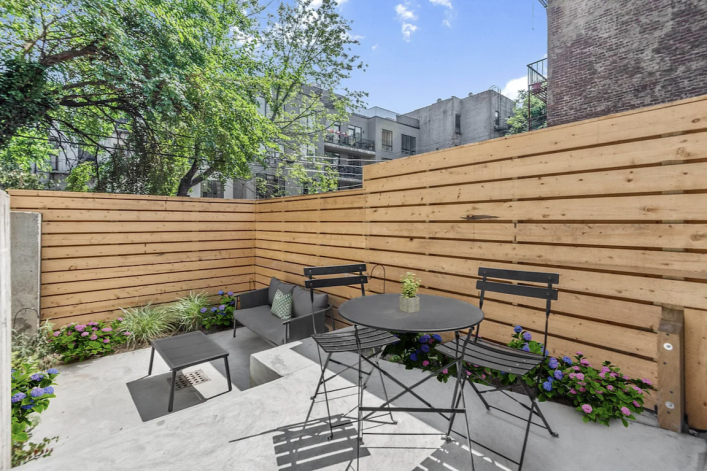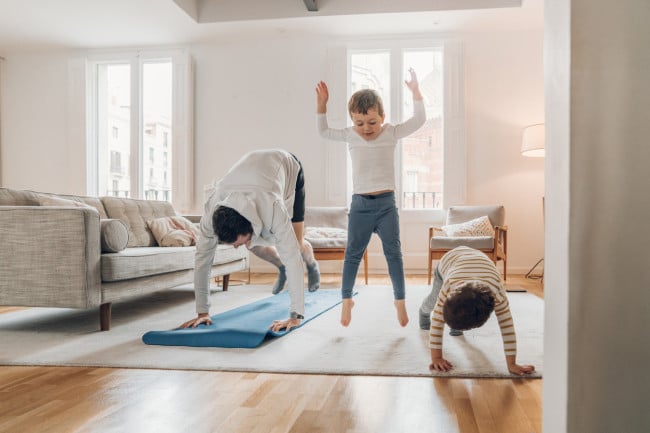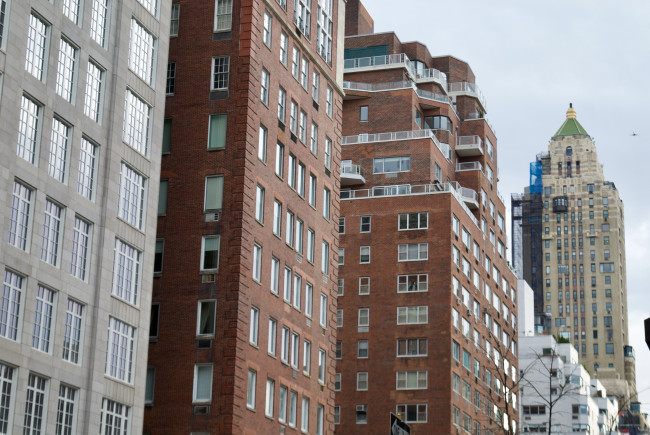7 reasons why ground-floor apartments are desirable—instead of dealbreakers
- They're as much as 15 percent cheaper than comparable apartments on average
- You don't have to worry about noise complaints from your downstairs neighbors
- Private backyards and separate entrances are common features of these units

A private backyard is a feature of unit 1A, a one-bedroom condo at 702 Hancock St., a new Passive House development in Stuyvesant Heights. The asking price is $750,000.
New Yorkers fall into two camps when it comes to ground-floor apartments—some prefer them, while others avoid them at all costs.
But choose wisely, and you'll be able to avoid or at least mitigate the possible pitfalls of first-floor living, including lobby and street noise, a lack of privacy and natural light, and a greater risk of pests, odors, and flooding (though you can never completely escape those city-living problems, even in a penthouse).
On the plus side, ground-floor units generally cost less than comparable apartments—generally speaking, the lower the floor, the lower the price. They can also better accommodate your lifestyle needs (especially in walkup buildings). And some lower-level units have features that make them more desirable than units on higher floors—namely, outdoor space or even duplex layouts.
Read on for what makes a ground-floor apartment worth considering.
[Editor's note: A previous version of this article was published in June 2024. We are presenting it here with updated information for May 2025.]
1. Lower prices on average
How much you might save on a ground-floor apartment will depend on various factors, such as location, exposures, square footage, layout, and any outdoor space. That said, the sales price of a first-floor unit is typically up to 15 percent lower than a comparable unit on a higher floor.
"If it's really close to the lobby and facing the front, that could be 20 percent less," said Kobi Lahav, director of sales at Living New York. "If it's facing the back and quiet but there's no light, it may be 10 or 15 percent less," he added.
One real-life example from Lahav is the case of two identical apartments on the Upper West Side. The second-floor unit sold for $1.55 million, while the rear unit on the ground floor sold for $1.35 million. If the ground-floor unit had been facing the street, Lahav suggested the price may have been further reduced to $1.2 or $1.25 million.
"Being in the front is a dealbreaker for many people," he said. "And if the window is directly facing something like a bus stop, that's going to be a 25 percent discount," he said. It's worth considering such factors for resale value, but if you are strapped for cash, these subprime apartments might be the only way to get your foot in NYC's real estate market.
Julia Hoagland, a broker at Compass, pointed out another upside: "Often the shares in co-ops are lower for lower-floor apartments, which lowers maintenance costs and frees up liquidity for other, more interesting expenditures."
Moreover, "given not everyone is open to ground-floor living, you're likely going to be competing against fewer buyers, which increases negotiating leverage," she added.
According to Lahav, however, people are more willing to consider buying on the ground floor when there's a severe lack of inventory, as is the case now. "I am seeing less hesitation, especially if it has outdoor space," he said.
2. No downstairs neighbors
Being on the ground floor can protect you against noise complaints from neighbors, especially if you have kids. Gerard Splendore, a broker at Coldwell Banker Warburg, knows firsthand the benefits of living on the ground floor.
"Our apartment was located over the laundry and storage rooms. My two children, as well as the other two who lived next to us, could—within limits—make as much noise as they liked and jump and run without concern about bothering neighbors below," he said.
3. No elevators or stairs
Tired of waiting for the elevator in the morning rush hour? Or maybe you live in a walkup and have to navigate the narrow stairwell, day in and day out.
Whatever the scenario, being able to step right out of your front door can be a huge perk, especially if you have a stroller, scooter, or bike in tow. The same applies if you do bulk shopping trips at Costco.
And get this: "You are never subject to the pain of elevator outages when maintenance is being done," Hoagland said—ditto for summer blackouts.
Splendore offers another unexpected benefit: "By facilitating access to the lobby, first-floor occupancy is convenient for building events such as annual meetings or the holiday potluck dinner. If there are not enough seats, a first-floor dweller can roll out a desk chair or stool."
4. Fewer missing packages
Now that online shopping is the new normal, so is the reality of package theft in NYC.
That's one reason Splendore sees "an updated bonus of first-floor apartment living" as the immediate acknowledgment of package delivery. "Post-pandemic, there are fewer brick-and-mortar retail outlets, with more deliveries—from diapers to groceries—coming directly to the lobby and, in many cases, to first-floor apartment doors. So there's less chance of packages disappearing," he said.
5. Cheaper moving costs
Don't underestimate this benefit—even simple moves in NYC add up.
"Movers in NYC will charge by the floor in walkups, so ground-floor moves equal cost savings," Hoagland said.
Or as Splendore explained it: "If the first-floor shareholders do not live in a co-op that requires large deliveries to go through the basement, first-floor delivery of appliances and move-in/move-outs can be much simpler by not requiring the use of an elevator, requesting elevator protection, or inconveniencing other shareholders."
That would seem to apply to renovations, too, where the meter is running every time workers have to wait for the service elevator.
6. Outdoor space (maybe)
One of the most common perks to offset the potential downfalls of a ground-floor apartment is the all-important backyard, a coveted amenity in a city with precious little outdoor space. It's also handy if you have a dog.
In some cases, landlords may renovate the backyard to make it more enticing (though if not, check out how to install low-maintenance fake turf).
And here's a pro tip: If you're hoping for a unit with outdoor space without stiff competition, you may be able to score a deal by looking in the colder months; when nice weather hits in spring, buyers quickly add outside space to their wish list. (The same goes for nabbing a rental on a garden level.)
If you're not seeing enough places—ground floor or otherwise—for sale in your price range or target neighborhood—and/or you'd like to avoid a bidding war—consider expanding your search to "off-market" listings. NYC real estate brokerage The Agency uses technology to mine public records and identify owners who may be ready to sell, meaning you can meet and deal with owners before their homes hit the market. Click here to learn more
7. Extra storage and square feet
If you are on the ground floor of a townhouse or brownstone, there's a good chance you'll get access to the building's basement, which could mean extra storage and even your own laundry room. You might also have a private entrance under the stoop and gain a de facto mudroom via the common hallway that leads down to the basement.
According to Hoagland, sometimes the ground floor of a co-op or condo "has a layout unique from any other floors, and owning a unique asset can help you stand out from the competition in a crowded marketplace."
She said the math might make sense even if your purchase doesn't come with these added benefits.
"You generally get more for your money in terms of square footage for the same price, given the cost differentials. Buying real estate involves deciding what one's personal goal priority tree looks like, and if space is number one over light and views, for example, a ground-floor apartment can be a perfect choice."
—Earlier versions of this article contained reporting and writing by Virginia K. Smith, Nikki Mascali, and Emily Myers. This article was updated for 2025 by Evelyn Battaglia.
You Might Also Like




























